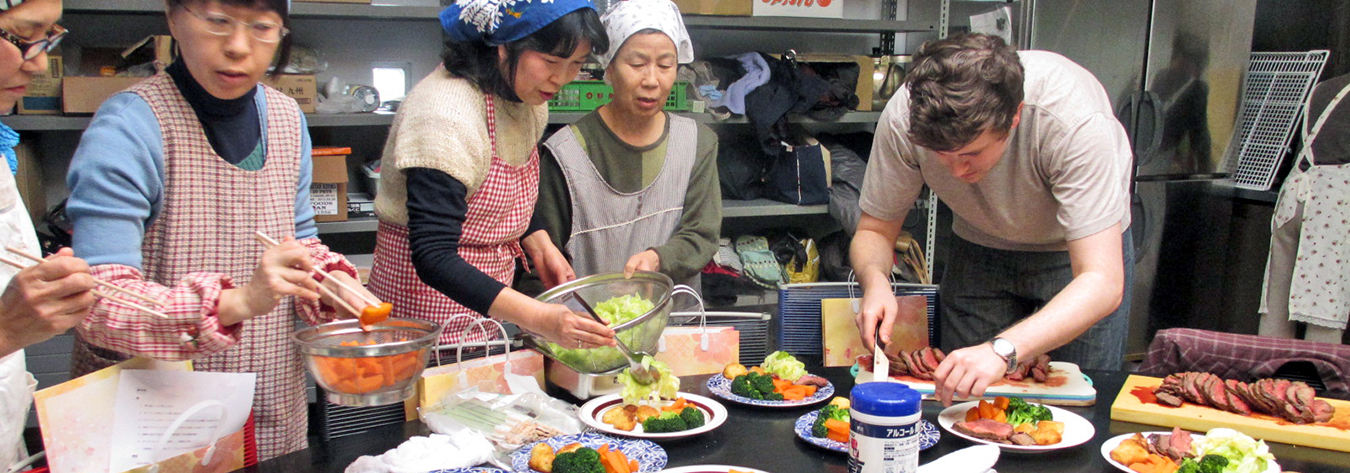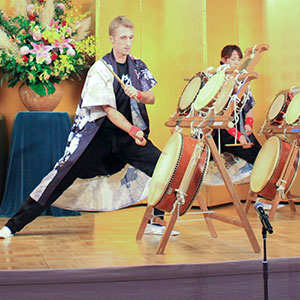Now in its 30th year, the Japan Exchange and Teaching (JET) Programme has welcomed more than 62,000 people from 65 countries to deliver grassroots international exchange between Japan and other nations. This column features former JET Programme participants who keep the idea of fostering mutual understanding firmly at heart.
As a non-Japanese living in Japan, perhaps the question you are asked the most is, “Why did you decide to learn Japanese?” I wish I had a better answer, but I decided to begin studying Japanese on a whim, because it was something new, different and exciting.
I have always been drawn to the “other” and Japan is about as other as you can get when you grew up in suburban Hampshire. But, as my studies progressed, I found myself increasingly drawn to the nuances of this “exotic” language and decided to continue my new passion at SOAS, at the University of London.
After a year abroad, reading at Keio University in Tokyo as part of my degree in Japanese, I found myself back in the UK, writing my dissertation and pining for onsen (hot springs). I applied to the Japan Exchange and Teaching (JET) Programme and was lucky to be placed as a coordinator for international relations in Miyagi Prefecture, working at both the prefectural office and the Miyagi International Association in Sendai.
I spent my first two years getting to grips with life as a working adult in Japan and finding my place in the office. From the beginning, I was tasked with challenging work including long, complicated translations, and interpreting for the governor during courtesy calls involving high-ranking foreign dignitaries. It was a baptism by fire; at that time just hearing the Japanese word for governor was all it took for cold perspiration to bead on my brow.
Looking back, I know that those experiences taught me the importance of being flexible and appearing confident, even when I don’t necessarily feel that way. I also had the opportunity to work with local residents. The project of which I am most proud is a series of UK cooking classes that I developed in an attempt to inform local people about real British cooking. The classes were a big success, and I was able to do a live cookery segment on television.
But everything changed on 11 March 2011 when the Great East Japan Earthquake struck. My workplace was 130km from the epicentre. I remember thinking that my office building couldn’t possibly withstand the incredibly violent shaking; I was certain the floor would fall from beneath my feet at any moment. The resulting tsunami killed more than 15,000 people and ravaged Tohoku’s Pacific coast.
After the disaster, I worked alongside two other programme participants and our Japanese supervisor to confirm the safety of our 63 programme colleagues working in Miyagi Prefecture. We also provided them with logistical support and counselling. The experience pushed us to our limits, but I feel lucky to have been on the programme in the area at that time.
I was truly moved by the strength, resilience and kindness of the local people, and the dedication of programme participants in Miyagi. In spite of the uncertainty and practical inconvenience of living in affected areas, the majority of those on the programme chose to stay and finish their tenures: a testament to the strong bonds fostered between participants and local regions.
Now, nearly five years later, the healing process in Tohoku remains ongoing. But the people of the region are strong, and recovery is only a matter of time. If you want to help, I recommend supporting tourism in the area. Visit spectacular onsen, and enjoy the beautiful scenery and culture.
I am still involved with the programme in my current position at its organising body, the Council of Local Authorities for International Relations. My role includes building and maintaining mutually beneficial relationships with organisations, promoting the programme on a global scale, and increasing awareness of its alumni as competent global talent for firms in Japan.
My relationship with Japan and the rich, fulfilling life I now lead is the result of a chance decision to try something new. My choice fills me with excitement about what could now be around the corner. Recalling that ubiquitous question, maybe my reason for learning Japanese was not so bad after all.







